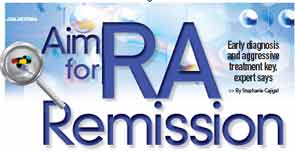
SANTA MONICA, CALIF.—The current state of rheumatoid arthritis (RA) treatment should include early diagnosis with an ultimate goal of remission, RA expert Paul Emery, MA, MD, said here on May 18 at the California Rheumatology Alliance 9th Annual Medical and Scientific Meeting.
Dr. Emery, professor of rheumatology and head of the academic unit of musculoskeletal disease at the University of Leeds in Leeds, U.K., opened his presentation by emphasizing the importance of early referral recommendations as a means of intervention.
At Leeds, for example, patients are referred by primary care physicians on the basis of new onset arthritis (nontraumatic) or symptoms of inflammation, including early morning stiffness or swelling or responses to nonsteroidal antiinflammatory drugs (NSAIDs). In fact, primary care providers are asked to refer patients on the basis of history rather than having them wait for test results.
“If they’d like to do the test, great, but don’t do the test and wait for the referral,” Dr. Emery said.
He noted that test results at this stage are likely to be negative. “Nearly the vast majority of patients will not have erosions,” he said. “CRP [C-reactive protein] won’t be raised in most of them, and only about 40% at this stage will have an autoantibody. As we begin to believe that the period of time before you start therapy is absolutely critical, then that’s not the way to handle patients, so primary care refers on the basis of history.”
If primary care physicians will not refer, Dr. Emery said he asks that they test for anticitrullinated protein antibodies (ACPA) and erythrocyte sedimentation rate (ESR) or plasma viscosity (PV), the latter two of which, he says, are more sensitive than a CRP test at onset. “You’ll find more patients who have raised ESR who have early onset,” he said.
Role of Guidelines
Dr. Emery also reviewed the impact of the ACR/ EULAR criteria for the classification of rheumatoid arthritis, pointing out there’s been a debate among rheumatologists about what RA actually is.
The 2010 criteria define RA as persistent small-joint arthritis, inflammatory arthritis requiring treatment with methotrexate (MTX), persistent synovitis with capacity to cause erosions as detected with an ultrasound, or intraarticular synovitis with erosions or precursors of erosions, such as osteitis, as seen on MRI.1
“The EULAR/ACR initiative was set up to have earlier identification of RA on the basis of a lot of data showing that early therapy was better and to differentiate from significant other pathology,” he said. “It used the requirement for MTX as a surrogate for diagnosis. Some people were very unhappy with that, but I think the new criteria have shown to be a valuable asset.”
